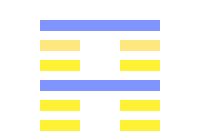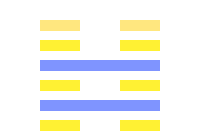52.1.2.3.4.6 (52 > 54)

52.1.2.3.4.6 (52 > 54) - THE KĂN HEXAGRAM.
- 1. The first line, divided, shows its subject keep- ing his toes at rest. There will be no error; but it will be advantageous for him to be persistently firm and correct.
- 2. The second line, divided, shows its subject keeping the calves of his legs at rest. He cannot help (the subject of the line above) whom he follows, and is dissatisfied in his mind.
- 3. The third line, undivided, shows its subject keeping his loins at rest, and separating the ribs (from the body below). The situation is perilous, and the heart glows with suppressed excitement.
- 4. The fourth line, divided, shows its subject keeping his trunk at rest. There will be no error.
- 6. The sixth line, undivided, shows its subject devotedly maintaining his restfulness. There will be good fortune.
52.1.2.3.4.6 (52 > 54) - Stop
One does not weaken in order not to be seen failing.
Bing DeepL Google Yandex52.1.2.3.4.6 (52 > 54) - Stop
One does not weaken in order not to be seen failing.
Bing DeepL Google Yandex52.1.2.3.4.6 (52 > 54) - Kán, l’arrêt
Kán : ferme, tenir droit, bien réglé, arrêter, reposer
-
1. (On doit) tenir fermes ses pieds ; i. e. être toujours d’une ferme droiture.
Ne jamais perdre sa droiture. -
2. « Arrêter le mouvement des jambes ». (Ou les tenir droites et bien posées.) Si, devant s’arrêter, on ne peut aider celui qui marche devant soi, on doit en avoir du déplaisir.
On doit aider et se rendre au cri d’appel. - 3. Se tenir ferme à sa place et le corps (litt. : les côtes) bien tenu, (c’est ainsi que l’on doit être).
- 4. Tenir le corps droit et ferme, c’est une bonne manière. [On doit tenir le corps entier tout droit.] (Répétition du § 3 pour en avoir six. Tenir le corps droit est un principe essentiel des rites chinois.)
-
6. Être tout appliqué à rester ferme dans le bien est une disposition très heureuse.
On peut ainsi être juste et droit jusqu’à la fin.
52.1.2.3.4.6 (52 > 54) - Cesser
On ne faiblit pas pour ne pas se faire prendre en défaut.
Bing DeepL Google Yandex52.1.2.3.4.6 (52 > 54) - Megállás
- 1. Nem megy megnézni mit tesznek a többiek hogy kerülje a bajokat.
- 2. Ha a másik többet akar, nem tarthatja vissza.
- 3. A legalkalmasabbat kéri ha mások nem válaszolnak.
- 4. Megáll, de mások folytatják.
- 6. Tanulmányozza környezete igényeit mielőtt foglalkozna azokkal.
The trigrams
The trigrams are combinations of three yin and yang lines. The three bottom lines of the hexagram form the lower trigram and represent the inner situation. The three top lines form the upper trigram and represent the outer situation.
Upper trigram: The mountain The thunder


Lower trigram: The mountain The lake


The formation: 52
What is already there

52 - THE KĂN HEXAGRAM.
When one's resting is like that of the back, and he loses all consciousness of self; when he walks in his courtyard, and does not see any (of the persons) in it, there will be no error.
Bing DeepL Google Yandex52 - Stop
One recognizes that it is time to stop because one needs to feed oneself.
Bing DeepL Google Yandex52 - Stop
One recognizes that it is time to stop because one needs to feed oneself.
Bing DeepL Google Yandex52 - Kán, l’arrêt
Kán : ferme, tenir droit, bien réglé, arrêter, reposer
Kan « ferme ». L’homme ferme tourne le dos et s’oppose résolument, sans tenir compte de lui-même. S’il traverse un endroit, il ne regarde pas qui y est et ne faillit point.
Texte
L’homme ferme s’oppose résolument (au mal) sans tenir compte de lui-même. Devant traverser un endroit, il ne regarde pas qui s’y trouve (mais le fait résolument) et ne faillit point.
Symbolisme
Deux montagnes superposées forment le Koua. Ainsi l’homme supérieur pense à ne pas dépasser les bornes de ses fonctions.
Commentaire
Kán signifie s’arrêter, tenir ferme, en bon ordre, agir ou s’arrêter selon l’occasion. Quand l’acte et sa cessation ont lieu en temps convenable, la conduite est belle et intelligente. « Rester à sa place », cela veut dire que les grands et les petits sont en rapport, mais sans usurpation ni entre-croisement. Celui qui est ferme et attentif à son devoir ne se recherche pas lui-même. Marchant dans son jardin, il ne voit pas même qui s’y trouve.
Note. Tout ceci illustre le sens « tenir droit, bien réglé » et se réfère aux rites du maintien extérieur qui prescrivent de se tenir toujours droit et de ne pas même s’asseoir sur un siège qui n’est pas droit.
52 - Cesser
On reconnaît qu'il est temps de s'arrêter car on a besoin de s'alimenter.
Bing DeepL Google Yandex52 - Megállás
Felismeri hogy itt az ideje megállni mert a többieket táplálni kell.
Bing DeepL Google Yandex
52.1 (52 > 22) - THE KĂN HEXAGRAM.
The first line, divided, shows its subject keep- ing his toes at rest. There will be no error; but it will be advantageous for him to be persistently firm and correct.
Bing DeepL Google Yandex52.1 (52 > 22) - Dropping one's probe
One is not going to see what others are doing, to avoid trouble.
Bing DeepL Google Yandex52.1 (52 > 22) - Dropping one's probe
One is not going to see what others are doing, to avoid trouble.
Bing DeepL Google Yandex52.1 (52 > 22) - Kán, l’arrêt
Kán : ferme, tenir droit, bien réglé, arrêter, reposer
(On doit) tenir fermes ses pieds ; i. e. être toujours d’une ferme droiture.
Ne jamais perdre sa droiture.
52.1 (52 > 22) - Renoncer à son enquête
On ne va pas voir ce que font les autres, pour éviter les ennuis.
Bing DeepL Google Yandex52.1 (52 > 22) - Megállás
Nem megy megnézni mit tesznek a többiek hogy kerülje a bajokat.
Bing DeepL Google Yandex
52.2 (52 > 18) - THE KĂN HEXAGRAM.
The second line, divided, shows its subject keeping the calves of his legs at rest. He cannot help (the subject of the line above) whom he follows, and is dissatisfied in his mind.
Bing DeepL Google Yandex52.2 (52 > 18) - Being attracted irresistibly
The other wants more, one cannot hold them back.
Bing DeepL Google Yandex52.2 (52 > 18) - Being attracted irresistibly
The other wants more, one cannot hold them back.
Bing DeepL Google Yandex52.2 (52 > 18) - Kán, l’arrêt
Kán : ferme, tenir droit, bien réglé, arrêter, reposer
« Arrêter le mouvement des jambes ». (Ou les tenir droites et bien posées.) Si, devant s’arrêter, on ne peut aider celui qui marche devant soi, on doit en avoir du déplaisir.
On doit aider et se rendre au cri d’appel.
52.2 (52 > 18) - Être attiré irrésistiblement
L'autre en veut plus, on ne peut pas le retenir.
Bing DeepL Google Yandex
52.3 (52 > 23) - THE KĂN HEXAGRAM.
The third line, undivided, shows its subject keeping his loins at rest, and separating the ribs (from the body below). The situation is perilous, and the heart glows with suppressed excitement.
Bing DeepL Google Yandex52.3 (52 > 23) - Losing blood
One asks the most capable when others don't answer.
Bing DeepL Google Yandex52.3 (52 > 23) - Losing blood
One asks the most capable when others don't answer.
Bing DeepL Google Yandex52.3 (52 > 23) - Kán, l’arrêt
Kán : ferme, tenir droit, bien réglé, arrêter, reposer
Se tenir ferme à sa place et le corps (litt. : les côtes) bien tenu, (c’est ainsi que l’on doit être).
Bing DeepL Google Yandex52.3 (52 > 23) - Perdre son sang
On demande aux plus capables quand les autres ne répondent pas.
Bing DeepL Google Yandex52.3 (52 > 23) - Megállás
A legalkalmasabbat kéri ha mások nem válaszolnak.
Bing DeepL Google Yandex
52.4 (52 > 56) - THE KĂN HEXAGRAM.
The fourth line, divided, shows its subject keeping his trunk at rest. There will be no error.
Bing DeepL Google Yandex52.4 (52 > 56) - Kán, l’arrêt
Kán : ferme, tenir droit, bien réglé, arrêter, reposer
Tenir le corps droit et ferme, c’est une bonne manière. [On doit tenir le corps entier tout droit.] (Répétition du § 3 pour en avoir six. Tenir le corps droit est un principe essentiel des rites chinois.)
Bing DeepL Google Yandex
52.6 (52 > 15) - THE KĂN HEXAGRAM.
The sixth line, undivided, shows its subject devotedly maintaining his restfulness. There will be good fortune.
Bing DeepL Google Yandex52.6 (52 > 15) - Managing anger
One listens to others before getting carried away.
Bing DeepL Google Yandex52.6 (52 > 15) - Managing anger
One listens to others before getting carried away.
Bing DeepL Google Yandex52.6 (52 > 15) - Kán, l’arrêt
Kán : ferme, tenir droit, bien réglé, arrêter, reposer
Être tout appliqué à rester ferme dans le bien est une disposition très heureuse.
On peut ainsi être juste et droit jusqu’à la fin.
52.6 (52 > 15) - Contenir sa colère
On écoute les autres avant de s'emporter.
Bing DeepL Google Yandex52.6 (52 > 15) - Megállás
Tanulmányozza környezete igényeit mielőtt foglalkozna azokkal.
Bing DeepL Google YandexIn the making: 54
What is poised to happen

54 - THE KWEI MEI HEXAGRAM.
Kwei Mei indicates that (under the conditions which it denotes) action will be evil, and in no wise advantageous.
Bing DeepL Google Yandex54 - Kvêi Mei, la fille à marier
Kvêi-Mei : marier une jeune sœur, une jeune fille.
Kwai « mariage, mariage d’une jeune sœur ». Si, en y procédant, on commet quelque faute, il n’en arrivera rien d’heureux. (Peut-être n’y a-t-il ici que prévision malheureuse opposée aux prévisions contraires du paragraphe 53).
Texte
On doit corriger le mal ou l’on n’aura aucun avantage. (Phrase mutilée. Voir II, § I.)
Commentaire
Marier une jeune sœur est un devoir suprême prescrit par le ciel et la terre (à ses frères). Quand le ciel et la terre sont sans relation, les êtres ne naissent pas. Marier une jeune fille est le principe et la fin de l’homme ; c’est un acte qui cause la joie.
Symbolisme
Le tonnerre au-dessus d’un marais forme le Koua. L’homme supérieur, pour s’assurer une fin heureuse, pense au malheur.
The nuclear hexagram: 40.1.2.3.4.5 (40 > 63)
The nuclear hexagram is the association of the two inner trigrams (lines 2,3,4 and 3,4,5). It represents the root, or the origin of the situation.

40.1.2.3.4.5 (40 > 63) - THE KIEH HEXAGRAM.
- 1. The first line, divided, shows that its subject will commit no error.
- 2. The second line, undivided, shows its subject catch, in hunting, three foxes, and obtain the yellow ( = golden) arrows. With firm correctness there will be good fortune.
- 3. The third line, divided, shows a porter with his burden, (yet) riding in a carriage. He will (only) tempt robbers to attack him. However firm and correct he may (try to) be, there will be cause for regret.
- 4. (To the subject of) the fourth line, undivided, (it is said), ‘Remove your toes. Friends will (then) come, between you and whom there will be mutual confidence.’
- 5. The fifth line, divided, shows (its subject), the superior man ( = the ruler), executing his function of removing (whatever is injurious to the idea of the hexagram), in which case there will be good fortune, and confidence in him will be shown even by the small men.
40.1.2.3.4.5 (40 > 63) - Behaving
One has respect for those who can take everything one has.
Bing DeepL Google Yandex40.1.2.3.4.5 (40 > 63) - Behaving
One has respect for those who can take everything one has.
Bing DeepL Google Yandex40.1.2.3.4.5 (40 > 63) - Kieh, la libération
Kieh : 1. Délivrer, faire échapper, échapper au danger ; 2. Disperser ; 3. Ouvrir, séparer, s’ouvrir. Se dit du mouvement de la germination. 4. Résoudre une difficulté, une complication.
-
1. Délivrer quelqu’un est chose excellente.
Quand le fort et le faible s’entendent selon la justice, il n’y a pas de faute à craindre. - 2. Délivrer est aussi heureux que, pour le chasseur, prendre trois renards et obtenir le prix, la flèche d’or. — Celui qui résout une difficulté, fait sortir d’une position difficile, est comme le chasseur qui prend trois renards et obtient la flèche d’or.
-
3. Si un porteur se met dans un char et qu’il survienne des voleurs, il sera attaqué et échappera difficilement ; s’il abandonne sa charge, il pourra se sauver.
Pour un porteur, aller en char est honteux ; c’est attirer sur soi les voleurs.
Il n’appartient pas à des gens du commun d’aller en char . -
4. Échappez d’abord et après cela les amis viendront témoigner leur fidélité (sinon ils vous abandonnent).
Note. Le mot qui signifie ordinairement gros orteil est expliqué par les commentateurs comme ayant ici le sens de tchū, commencement, d’abord - 5. C’est au sage d’écarter (les maux) et de résoudre (les difficultés) ; s’il y réussit, il gagnera la confiance du vulgaire.
40.1.2.3.4.5 (40 > 63) - Se tenir à carreaux
On a du respect envers ceux qui peuvent prendre tout ce qu'on possède.
Bing DeepL Google Yandex40.1.2.3.4.5 (40 > 63) - Módosítás
- 1. Fel akarja szabadítani magát, ez egy jó döntés.
- 2. Megkérik hogy válaszokat keressen mielőtt túl késő.
- 3. Ha valaki elhanyagolja, másoknak adja.
- 4. Ajtók fognak megnyílni ha valaki felhagy a felesleges kényelemkereséssel.
- 5. Csak egy alkalmas személy tudja megmutatni a megoldást.
Ruler
The starting situation

52.6 (52 > 15) - THE KĂN HEXAGRAM.
The sixth line, undivided, shows its subject devotedly maintaining his restfulness. There will be good fortune.
Bing DeepL Google Yandex52.6 (52 > 15) - Managing anger
One listens to others before getting carried away.
Bing DeepL Google Yandex52.6 (52 > 15) - Managing anger
One listens to others before getting carried away.
Bing DeepL Google Yandex52.6 (52 > 15) - Kán, l’arrêt
Kán : ferme, tenir droit, bien réglé, arrêter, reposer
Être tout appliqué à rester ferme dans le bien est une disposition très heureuse.
On peut ainsi être juste et droit jusqu’à la fin.
52.6 (52 > 15) - Contenir sa colère
On écoute les autres avant de s'emporter.
Bing DeepL Google Yandex52.6 (52 > 15) - Megállás
Tanulmányozza környezete igényeit mielőtt foglalkozna azokkal.
Bing DeepL Google YandexCorrection
The direction where the ruler is going to bend

52.1.2.3.4 (52 > 38) - THE KĂN HEXAGRAM.
- 1. The first line, divided, shows its subject keep- ing his toes at rest. There will be no error; but it will be advantageous for him to be persistently firm and correct.
- 2. The second line, divided, shows its subject keeping the calves of his legs at rest. He cannot help (the subject of the line above) whom he follows, and is dissatisfied in his mind.
- 3. The third line, undivided, shows its subject keeping his loins at rest, and separating the ribs (from the body below). The situation is perilous, and the heart glows with suppressed excitement.
- 4. The fourth line, divided, shows its subject keeping his trunk at rest. There will be no error.
52.1.2.3.4 (52 > 38) - Stop
One tells others old jokes to fill the silence.
Bing DeepL Google Yandex52.1.2.3.4 (52 > 38) - Stop
One tells others old jokes to fill the silence.
Bing DeepL Google Yandex52.1.2.3.4 (52 > 38) - Kán, l’arrêt
Kán : ferme, tenir droit, bien réglé, arrêter, reposer
-
1. (On doit) tenir fermes ses pieds ; i. e. être toujours d’une ferme droiture.
Ne jamais perdre sa droiture. -
2. « Arrêter le mouvement des jambes ». (Ou les tenir droites et bien posées.) Si, devant s’arrêter, on ne peut aider celui qui marche devant soi, on doit en avoir du déplaisir.
On doit aider et se rendre au cri d’appel. - 3. Se tenir ferme à sa place et le corps (litt. : les côtes) bien tenu, (c’est ainsi que l’on doit être).
- 4. Tenir le corps droit et ferme, c’est une bonne manière. [On doit tenir le corps entier tout droit.] (Répétition du § 3 pour en avoir six. Tenir le corps droit est un principe essentiel des rites chinois.)
52.1.2.3.4 (52 > 38) - Cesser
On raconte aux autres des blagues éculées pour meubler le silence.
Bing DeepL Google Yandex52.1.2.3.4 (52 > 38) - Megállás
- 1. Nem megy megnézni mit tesznek a többiek hogy kerülje a bajokat.
- 2. Ha a másik többet akar, nem tarthatja vissza.
- 3. A legalkalmasabbat kéri ha mások nem válaszolnak.
- 4. Megáll, de mások folytatják.

